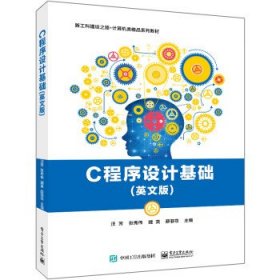
C程序设计基础(英文版)
①全新正版,现货速发,7天无理由退换货②天津、成都、无锡、广东等多仓就近发货,订单最迟48小时内发出③无法指定快递④可开电子发票,不清楚的请咨询客服。
¥ 53.33 7.6折 ¥ 69.8 全新
库存2件
浙江嘉兴
认证卖家担保交易快速发货售后保障
作者编者:汪芳//张秀伟//魏英//薛菲菲|责编:路越
出版社电子工业
ISBN9787121459771
出版时间2023-07
装帧其他
开本其他
定价69.8元
货号31812801
上书时间2024-10-13
- 在售商品 暂无
- 平均发货时间 18小时
- 好评率 暂无
- 最新上架
商品详情
- 品相描述:全新
- 商品描述
-
作者简介
汪芳,硕士,副教授。1995-1999,西北工业大学,本科;2001-2004,西北工业大学,硕士;2005-2006,德国IFW研究所,公派访问学者;2014-2015,美国莱斯大学,公派访问学者。参加的学术组织及任职:中国高校计算机大赛移动应用创新赛执委会成员;ICPC国际大学生程序设计竞赛亚洲赛站共同主任。个人/集体荣誉:西北工业大学最满意教师;西北工业大学十育人先进个人,教师代表;《FundamentalsofCprogramming》获省级一流本科课程(线上),中国高校计算机教育MOOC联盟优秀课程,负责人;《C++程序设计》,获国家级精品课程,国家级一流本科课程,重要成员。个人/集体荣誉:(1)校级最满意教师、校级\"三育人先进个人”、校级先进工作者多次;(2)省级一流课程负责人:2门。承担过的重点科研项目:①基于全球胜任力的程序设计(英)在线教学研究与实践,西北工业大学教育教学改革研究项目,第一完成人;②程序设计基础(英语),西北工业大学研究型教学示范课程建设项目,第一完成人;③基于华为全栈AI的智能科学系列课程建设,教育部产学合作协同育人项目,主要完成人。教学成果获奖情况:①参与时空一体、知行并进、学做融创的计算机基础教学改革实践,校级优秀教学成果奖一等奖;②在程序设计课程中加强学生自主学习的改革与实践,校级二等教学成果奖;③程序设计基础(英语)国际化改革与实践,校级二等教学成果奖。主要著作出版情况:①C++程序设计,西安电子科技大学出版社,2009年;②软件工程,西北工业大学出版社,2010年;③大学计算机实验教程,西北工业大学出版社,2013年④大学计算机基础学习辅导与实训,西北工业大学出版社,2013年;⑤C程序设计习题与解析,清华出版社,2011年。
目录
Contents
Chapter 1 Introducing C1
1.1 Why programming is important1
1.2 Why C2
1.3 History of C3
1.4 Strengths and Weaknesses of C4
1.5 How to learn C?6
1.5.1 Code::Blocks6
1.5.2 XCODE13
1.5.3 online compiler16
1.5.4 How to sign in to ICOURSE (MOOC) and XUETANG17
1.5.5 Can’t find GNU GCC Compiler20
1.5.6 I can’t debug21
quiz 1.23
Chapter 2 Data Types and Expressions24
2.1 The General Form of a Simple Program24
2.2.1 The General Form27
2.2.2 Variables and Assignment31
2.2 Character set and Keywords33
2.2.1 Character set33
2.2.2 Keywords34
2.2.3 Identifiers34
2.3 Data Types35
2.3.1 integer types37
2.3.2 floating types38
2.3.3 Character types39
2.3.4 void type41
2.3.5 Variables42
2.4 Constants and Variables45
2.4.1 Constants45
2.5 Operators and Expressions50
2.5.1 Arithmetic Operators52
2.5.2 Assignment Operators54
2.5.3 Increment and Decrement Operators57
2.5.4 The sizeof Operator58
2.5.5 The Comma Operator59
2.5.6 The conditional operator59
2.5.7 Bitwise Operators60
2.5.8 Expression Statement61
2.5.9 Type Conversion61
quiz 2.63
Chapter 3 Program control structure64
3.1 Statement64
3.2 Input and output65
3.2.1 Single Character Input/output66
3.2.2 Formatted Input and Output68
3.2 The scanf Function83
3.3 The sequence structure92
3.4 The selection structure95
3.4.1 Relational Expressions97
3.4.2 Logical Expressions99
3.4.3 The if Statement102
3.4.5 The switch Statement112
3.5 The loop structure119
3.5.1 While loop120
3.5.2 do while loop124
3.5.3 for loop129
3.5.4 Exiting from a Loop133
Quiz 3137
Chapter 4 The Preprocessor141
4.1 Preprocessor Directives141
4.2 Macro Definitions142
4.3 File Inclusion145
Quiz 4146
Answer 4146
Chapter 5 Arrays147
5.1 One-Dimensional Arrays147
5.1.1 The declaration of a one-dimensional array147
5.1.2 Access array elements149
5.1.3 Index150
5.1.4 Initialization151
5.1.5 Variable-Length Arrays152
5.2 Multidimensional Arrays152
5.2.1 Declaration of a two-dimensional array152
5.2.2 Variable-Length 2D arrays154
5.2.3 Initializing a 2D Array157
5.2.4 Application of the 2D Array157
Quiz 5.158
Answer158
Chapter 6 Functions160
6.1 Introduction160
6.2 Defining and Calling Functions162
6.3 Arguments168
6.4 The return Statement170
6.5 Declaration175
6.6 Array arguments176
6.7 Recursion179
6.8 Sort algorithm180
6.9 Program Organization188
6.9.1 Scope188
6.9.2 Local variables and Global variables189
Quiz 6195
Answer196
Chapter 7 Pointers197
7.1 Pointer Variables197
7.2 The Address and Indirection Operators198
7.3 Pointers as Arguments199
7.4 Pointers as Return Values201
7.5 Using Pointers for Array201
7.6 Array Arguments204
7.9 Pointers and Multidimensional Arrays205
7.10 Pointers to Functions207
Quiz 7208
Answer209
Chapter 8 Strings210
8.1 String Constants and Variables210
8.1.1 String Constants210
8.1.2 String Variables211
8.2 Reading and Writing Strings212
8.2.1 Writing Strings212
8.2.2 Reading Strings213
8.3 Accessing the Characters in a String214
8.4 Using the C String Library215
8.4.1 strcpy and strncpy215
8.4.2 strlen216
8.4.3 strcat and strncat216
8.4.4 strcmp217
8.5 sprintf and sscanf218
8.6 Array of Strings219
8.7 Array of Pointers to Strings220
Quiz 8.221
Answer222
Chapter 9 Structures, Unions, and Enumerations223
9.1 Structure Variables223
9.1.1 Structure Variables223
9.1.2 Structures as Arguments and Return Values228
9.1.3 Arrays of Structures230
9.1.4 Pointers to structs231
9.2 Unions231
9.3 Enumerations233
Quiz 9234
Answer236
Chapter 10 LinkedList237
10.1 Introduction237
10.3 creating a linked list239
10.4 Insert a node242
10.5 Search a node245
10.6 delete a node245
Chapter 11 Files247
11.1 Streams247
11.2 File Operations248
11.2.1 Opening a file249
11.2.2 Closing a file251
11.2.3 remove and rename functions251
11.2.4 Detecting End-of-File and Error Conditions252
11.3 Input/Output operation on File253
11.3.1 Character Input/Output Functions253
11.3.2 Line Input/Output Functions255
11.3.3 Formatted Input/Output Functions257
11.3.4 Block Input/Output Functions259
11.4 File Position260
Quiz 11261
Answer 11261
内容摘要
编程技术是信息技术中最重要的技能和工具之一,它是连接信息和计算机的桥梁。掌握并熟练使用编程语言已成为所有大学生必备的技能。 C语言是高级编程语言的先驱,也是最重要和最流行的语言之一。本书的目标是引导初学者进入程序设计的殿堂,内容涉及编程基础知识包括运算符和表达式、数据输入和输出、选择结构、循环结构、数组、函数、指针、结构体、链表和文件读写等。主要侧重于C语言的基本语法和编程的基本技能。我们将通过大量简洁的程序示例指导您构建编程思维并编写程序。本书旨在帮助学生掌握C语言编程技能,并为其他课程奠定基础,如C++、数学建模、操作系统、计算机图形学、系统仿真等。本书既可以作为大学本科计算机专业和非计算机专业的程序设计基础课程教材,也可以用作大专院校授课教材,亦是一本不可多得的自学教材。
相关推荐
— 没有更多了 —
















以下为对购买帮助不大的评价